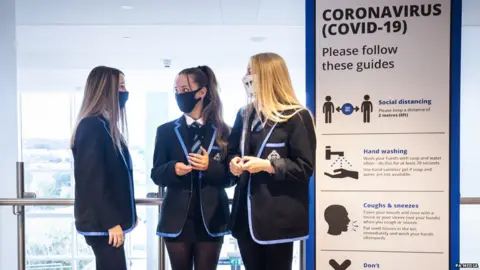Staggered return for England's secondary schools next term
 PA Media
PA MediaThe return to secondary school in January will be staggered in England, with some pupils starting online rather than in class, says the government.
It will allow schools to set up a Covid testing scheme - but exam-year pupils will start term as usual.
The National Education Union said making the announcement right at the end of the school term showed "panic".
Education Secretary Gavin Williamson said testing would "clamp down" on the virus after the Christmas break.
"Armed forces personnel" will support the planning for testing in schools, says the Department for Education.
Apart from those taking GCSEs, A-levels and vocational exams next year, secondary school pupils will study online for the first week back in January.
This is to allow schools to make preparations for mass Covid testing - which will offer school staff a test each week and a daily test for seven days for pupils in contact with a positive case.
Those exam year pupils returning for face-to-face lessons will also be offered tests, with all testing to be on a voluntary basis and requiring parental consent.
Face-to-face learning is expected to re-start for all by 11 January.
A similar scheme has been announced for Wales, where schools went online on Monday. A full return to the classroom is expected by 18 January at the latest.
'Shambles'
But school leaders have reacted angrily at having to set up and manage such a testing system with so little notice - with the National Association of Head Teachers calling it a "shambles".
"They have handed schools a confused and chaotic mess at the eleventh hour," said the union's leader Paul Whiteman.
Jules White, head of Tanbridge House School in Horsham, said: "The government has spent £22bn on a mass testing programme for test and trace.
"Schools are being asked to deliver mass testing for staff and students during the Christmas period with no funding, an 'idiot's guide' handbook and barely any notice."
The government is insisting the change to the start of term is not an extension to the school holidays and primary schools will not be affected by the move.
'Army of volunteers'
But it comes after the Department for Education instructed all local authorities to keep schools open in the final days of term, despite several initially telling parents that schools would close early and head teachers calling for more flexibility for online study.
Teaching unions have challenged the practicality of being expected to train and deploy an "army of volunteers" to run the testing.
The National Education Union has now written to Education Secretary Gavin Williamson saying the plans for a school testing system are "inoperable".
It said: "Telling school leaders, on the last day of term [for many schools], that they must organise volunteers and parents, supported by their staff, to test pupils in the first week of term, whilst Year 11 and 13 pupils are on site for in-school teaching, is a ridiculous ask."
Teachers were already "exhausted by the unreasonable demands, backed by legal threats, that they have been subjected to this term", said the union's letter.
It added that running such medical procedures was "significantly outside the experience and job description" of school staff, highlighting expert advice that tests carried out by non-specialists were less likely to be effective.
'No time to prepare'
Patrick Roach, general secretary of the NASUWT teachers' union said: "Yet again the government is announcing significant changes affecting schools with little or no time to prepare before the Christmas closure period."
He said it was not the responsibility of teachers or school leaders to undertake testing of pupils or employees.
"The government has to ensure that it puts into place all the necessary resources needed to deliver the practical and financial support to schools to ensure safety in schools," said Dr Roach.
Association of School and College Leaders general secretary Geoff Barton said: "We are very concerned about the feasibility of setting up a testing programme at the scale envisaged."
He added: "The profession is very willing to work with the government over how to roll-out mass testing, but ministers must understand that chaotic, last-minute announcements do not constitute a collaborative approach."
Infection rates
As the plans for January have been announced, an official study suggests virus rates in schools reflect the levels in their local communities.
Virus rates have been growing fast in some areas, including London and south-east England, in recent weeks, with many schools affected.
The analysis of tests on 10,000 staff and pupils from Public Health England, Office for National Statistics and the London School of Hygiene and Tropical Medicine found 1.24% of pupils and 1.29% of staff tested positive for coronavirus in schools.
However, the impact of those cases will have been felt by many more, as close contacts were required to go home and self-isolate.
The governments of Scotland, Wales and Northern Ireland have not announced any changes to the start of the January term, but schools in Wales moved online last Monday.
